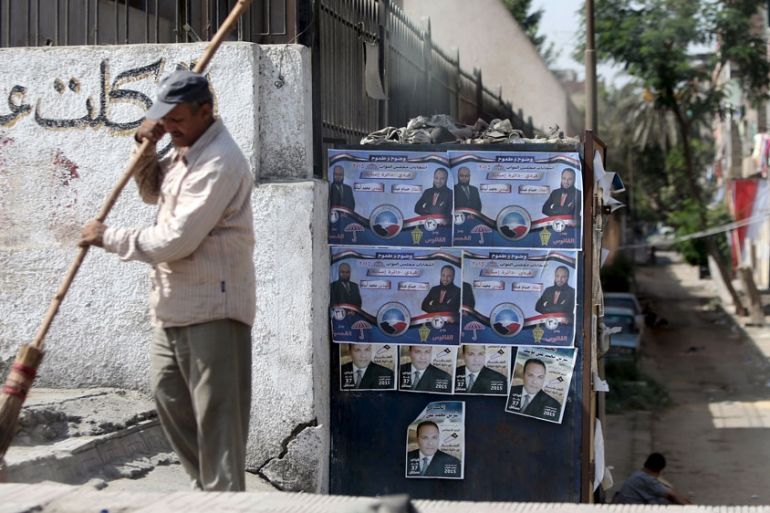Egypt’s new parliament: control and fragmentation
Parliamentary elections are being held against a backdrop of liberal parties weakened by restrictions and infighting.

By holding parliamentary elections on October 18, Egypt completes the third and final phase of the roadmap and, presumably, another transition on the road to democracy, as the military-backed regime claims. The new parliament will draw the lines between the executive and legislative authorities to determine whether they will be blurred or well-defined.
Egypt has been without a parliament since June 2012, thus, allowing General Abdel Fattah el-Sisi to wield massive executive and legislative powers.
Keep reading
list of 4 itemsWhat challenges do Turkey, Egypt face in restoring ties?
Yusuf al-Qaradawi, the Muslim scholar who influenced millions
Qatar’s emir in Cairo for talks with Egypt’s president
The elections take place within a climate of severe repression of fundamental freedoms of expression, assembly, and the press. Sisi’s anti-protest law, anti-terrorism law, and NGO laws have thrown real contenders out of the competition.
The most serious opponent, the Muslim Brotherhood, has been under severe regime crackdown; its political party has been banned, and the group has been declared a terrorist organisation. The liberal parties are weak and fragmented, either as a result of legal restrictions, infighting, or a lack of coordination.
|
|
| The Listening Post – Muzzling the media: Egypt’s new ‘anti-terror’ laws |
Many youths are boycotting the elections. They believe the new parliament to be similar to the 2010 parliamentary elections that were massively rigged – with the National Democratic Party (NDP) winning 91 percent.
Under watchful eyes
Similar to Mubarak’s authoritarian days, the elections are taking place under the state’s watchful eyes. The intelligence authorities are managing and engineering the elections.
Reportedly, the Salafist Nour Party reduced its lists from four to two, yielding to “advice” from security agencies. Several candidates have been vetted by the security agencies to ensure that the new parliament will not include strong voices of dissent.
Also read: Egypt’s injustice system
The regime is taking no chances and has eliminated competitive electoral lists on shaky technical reasons.
Its own list, “For the Love of Egypt”, is expected to secure a comfortable majority. The list, which is headed by a former intelligence general close to Sisi, consists of 10 political parties, including the Free Egyptians founded by Coptic billionaire Naguib Sawiris.
”Like
will be viewed as lacking legitimacy.”]
Most likely, the regime will report a high percentage of participation to don legitimacy to the process and solicit the usual approval of its international backers.
Sisi has avoided building political machinery to dissociate himself from the NDP experience and to suit his personal style of rule. But this deprives him of a necessary mechanism that can organise, structure votes, and issue laws in a way that allows him to claim a seeming appearance of legitimacy.
The new parliament will produce two main vocal fronts: the “Yes” front and the “Yes, Sir” front. Both are expected to compete in showing their loyalty to Egypt’s new autocrat. Otherwise, the entire parliament is under the threat of dismissal because of the flawed laws that organise the elections.
More specifically, the new parliament will be formed largely of businessmen, former security officers, Mubarak’s men, recently formed parties or lists supported by businessmen.
The new distribution allocates 120 of 568 seats to party and independent lists and 448 to independents and gives the president the authority to appoint 28 members.
The structuring of districts clearly favours independents and candidates with money and connections – a throwback to Mubarak’s era, but without systematic rigging or prior appointment of candidates by the NDP apparatus.
The duties of new parliament
Top items on the new parliament’s agenda are amending the constitution to give Sisi more executive powers and approving the over 300 laws which he has issued.
In theory, and according to the constitution, the parliament yields wide powers. It can restrict the president’s authority to name a prime minister, withdraw confidence, and even impeach the president.
Also read: The death of sanity in Egypt
The parliament also limits the executive authority in contracting loans or obtaining funds. These are reasons that propelled Sisi to hint recently to the need to amend the constitution to allow for a strong presidential system. It is expected that the new parliament will yield.
In addition to amending the constitution, the parliament is expected to act as a rubber stamp. By law, the parliament only has two weeks to approve the laws issued since the coup.
Sameh Seif el-Yazal, the head of the pro-Sisi coalition, “For the Love of Egypt”, affirmed that the parliament “should approve these laws and debate them afterwards”.

Despite its expected support for Sisi, the new parliament may still witness some debate and exercise pressure.
Sisi’s loyalist camp is not homogeneous: It conceals deep conflicts among its main components – namely the security agencies, businessmen, and media personalities – over power, influence and economic privileges.
This conflict will eventually transpire over policies, allocations and government performance in the new parliament, or will simply be driven by personal rivalries.
The new parliament faces a serious challenge in gaining the trust of Egyptians. Like Mubarak’s parliament and in contrast to the Muslim Brotherhood-dominated parliament of 2012, it will be viewed as lacking legitimacy.
While it will reflect the serious conflicts among various interest groups inside Sisi’s coalition, it will force many to conduct politics outside formal channels. The final step in the roadmap might not be the panacea for stability that Sisi’s regime desperately needs.
Emad Shahin is Visiting Professor, Georgetown University.
The views expressed in this article are the author’s own and do not necessarily reflect Al Jazeera’s editorial policy.
